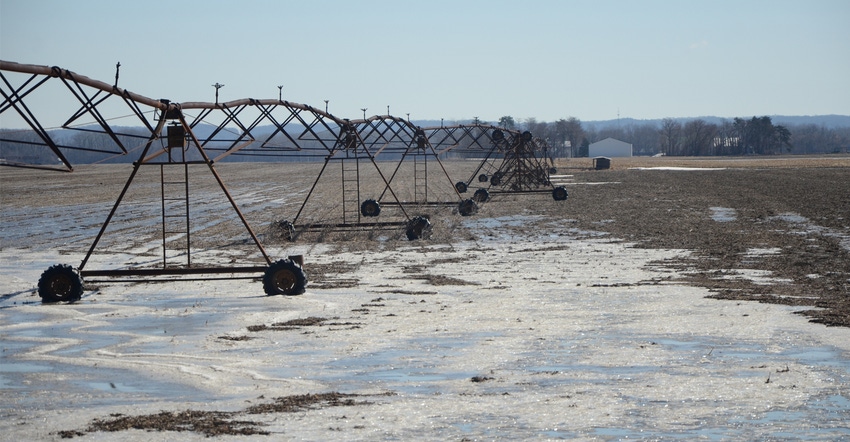April 3, 2019

By Aaron Nygren, Steve Melvin and Troy Ingram
With the recent widespread flooding, many irrigation systems across Nebraska have been affected. As waters drain and soils dry out, part of the recovery process will include checking irrigation systems for damage and performing maintenance and repair before those systems can be used.
Above all else, staying safe is critical, so make sure that electricity is shut off when inspecting electrical components. Double-check to confirm that the power is off and that it cannot be restored before completion of the inspection or repair work.
It is advised to contact your local well or pivot company service technician to get your systems inspected, as damage may have occurred, and more damage could be caused by operating the system.
Depending on the water level, inspection and maintenance might be needed for the power unit, irrigation well and center pivot. Listed below are areas to look at with each of these components:
Power unit. If water reached the power unit, maintenance is needed before operating the system. Do not attempt to start the electric motor until it has completely dried out or damage may occur.
This may require the motor being removed, brought into the shop and disassembled to make sure everything is OK, so it is recommended to check with your pump company. Once the motor is dry, it is advised to drain the oil and replace it.
In addition, be sure to grease the motor bearings by removing the relief plug and adding grease until the old grease is expelled.
If the water completely submerged the internal combustion engine, it will require major servicing, which should be performed as quickly as possible and may require a complete rebuild. This will include draining and replacing the oil, pulling injectors or spark plugs to make sure no water is in the cylinders before turning over the engine, and replacing all filters.
Electrical systems may be damaged and need repair or replacement. Also, check the fuel system for water, and drain if water is present.
Irrigation well. Once the power unit is inspected, the next concern is if the well had contamination or debris go down the column. This is of more concern if the system had an open discharge pipe such as a gravity irrigation system.
Wells with proper functioning backflow valves should be less likely to have contamination or debris. If debris is possible, make sure the pump turns freely before operation or damage may occur to the impellers.
Once the power unit is operable, it may be helpful to start up wells that were flooded to pump contaminates out. As a precaution, you may choose to shock-chlorinate the well to kill any bacteria that might be present.
Well gearheads usually are sealed well, but it is still advised to drain the oil, flush if possible and refill with new oil.
Center pivot. The main components to check on center pivots are the wheel and center drive gearboxes, center drive motors on electric drive pivots, tower boxes if the water reached them, and the pivot panel.
Hydraulic drive pivots still would need the wheel gearboxes checked, but the hydraulic system should be OK unless the pump or oil reservoir were submerged.
With gearboxes, drain any water present. If the oil appears contaminated, drain and refill with new oil. The center drive motors should be inspected to make sure they are dry and free of debris, which may require removing the stator housing from the motors.
If water reached the pivot panel or the tower boxes, it is recommended to have a service technician or electrician inspect them. Be sure to let them dry out completely before servicing. Both basic and computer panels may operate after drying out and cleaning, but they often will need to be replaced.
Nygren is a Nebraska Extension educator, Melvin is an Extension irrigation cropping systems educator, and Ingram is an Extension educator.
This report comes from UNL CropWatch, which is solely responsible for the information provided and is wholly owned by the source. Informa Business Media and all its subsidiaries are not responsible for any of the content contained in this information asset.
You May Also Like




